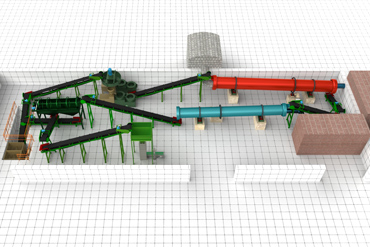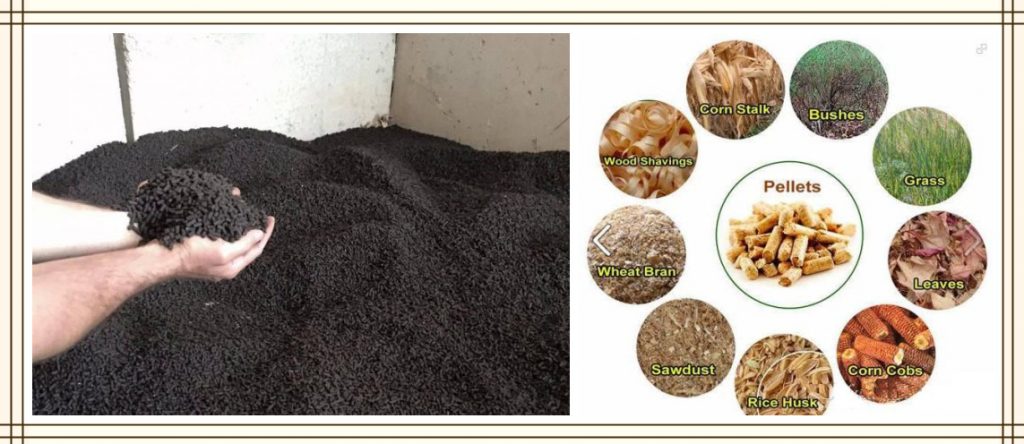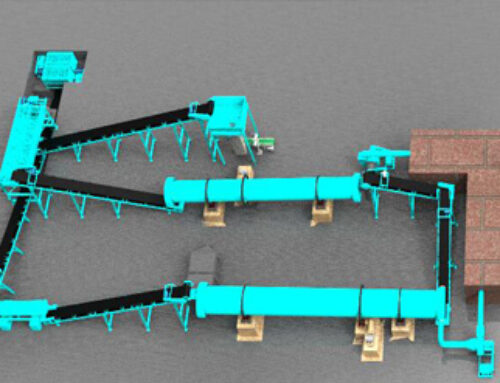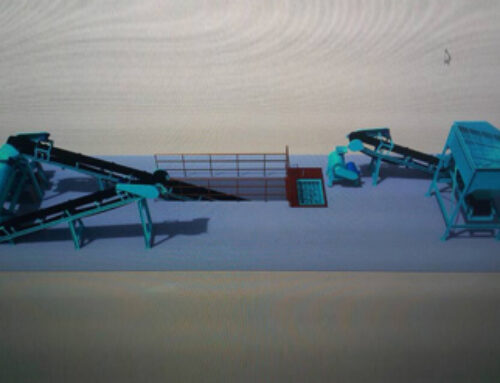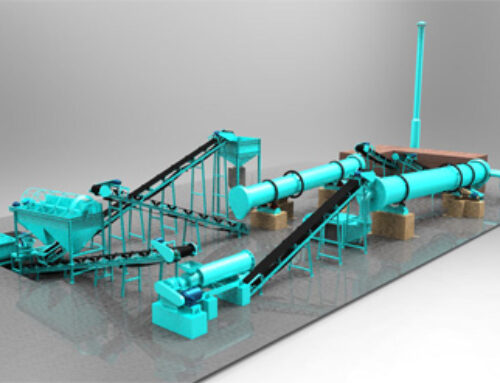The organic fertilizer production line is specially designed to convert poultry manure such as pig manure, cow manure, and chicken manure into sellable organic, environmentally safe fertilizer pellets that do-it-yourself retail chains and lawn & garden stores can sell to consumers. High performance & Environmentally friendly!
agricultural production companies, independent farmers, golf courses, and commercial landscapers can use those organic manure fertilizer pellets
We call this plant a Flat-die fertilizer Production Line because flat die fertilizer pellet machine is installed to fulfill the whole pelletizing process. The production plant produces 30,000 tons of high-quality bio-organic fertilizer per year through the harmless disposal of animal manure, and organic waste materials, furnishing soil and crops with all-around nutrients. In virtue of reliable performance and advanced processing technology, it has been widely applied in fertilizer processing enterprises, creating economic benefits as well as making great contributions to environmental protection.
Working Process of Organic Fertilizer Pellets Production Line
Raw materials crushing:
For better fermentation, raw materials need to be crushed via the corresponding fertilizer crusher because the particle size of composting raw material may affect the activity of microorganisms. The Crushing machine can reduce the particle size of materials in order to add superficial area, facilitate microbial activity and then speed up the fermentation composting. By virtue of reliable performance and excellent crushing effect, our semi-wet material crusher has been widely applied for grinding bio-organic fermentation, urban waste compost, crop straw fermentation, livestock manure, and other high-moisture materials.
Raw materials fermentation:
In the organic fertilizer production process, fermentation of raw materials is a crucial part because most raw materials should be composted and fermented so as to reach harmless disposal standards. Based on the principle of aerobic fermentation, our self-propelled compost turner adopts 4 wheels design and has a large turning capacity and strong adaptability to the site, which can be used to mix materials, adjust the temperature of the material pile, improve the permeability, and regulate the moisture of pile, then expediting the speed of aerobic fermentation. On account of its obvious advantages like low investment and labor cost, complete function, and high efficiency, this compost turner has become the first choice for many organic fertilizer manufacturers.
Raw materials mixing:
Before fertilizer granulation, raw materials should be mixed adequately and evenly within a horizontal fertilizer mixer WSJB-90 so as to realize ingredients uniform and fast mixture and reduce material residues. With high mixing efficiency and reasonable structure, this mixer, very suitable for blending raw materials of organic fertilizer, has enjoyed great popularity among fertilizer producers.
Granulating process:
After even mixing, raw materials are transported to the flat die granulator KP-40 with a belt conveyor for the core part of the whole 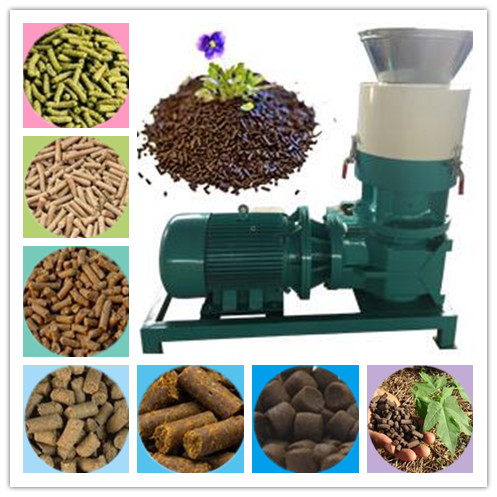
Granule polishing process:
In order to embellish the appearance of pellets from flat-die granulators, we suggest using a granule polishing machine to process fertilizer granules into spherical particles because it can realize the granulation ratio up to 98% at one time and greatly raise the quality and level of final organic fertilizers for more enormous market and higher profits.
Drying/Cooling process:
The pellets need to be dried with a professional drying machine with the purpose of adding fertilizer strength and convenient storage. Our rotary fertilizer dryer HGJ-1.2 is the perfect drying equipment to decrease the water content of granules. According to experience, the moisture of organic fertilizer pellets produced by the flat-die granulator can be dropped down to 2%~5% from 10%~40%. Meanwhile, this dryer should be used combined with rotary drum cooling machine LQJ-1.0 because the temperature of fertilizer is very high after drying which should be cooled at a certain temperature for easy storage and transportation. With high heating/cooling efficiency, our rotary dryer and rotary cooler are quite appropriate for organic fertilizer granules as well as raw materials for fertilizer production.
Screening process:
For separating final fertilizer products from the returned materials that cannot satisfy quality requirements, the rotary drum screening machine GTSF-1.2*4 should be adopted for the sake of realizing the uniform classification of finished fertilizer products. This screening equipment has a series of merits, including high screening efficiency, low noise, little dust, simple structure, long lifespan, stable running performance, etc. Owing to the plate cleaning sieve, our rotary screening device makes it easy to screen even sticky, wet, and miscellaneous materials without blocking the sieve, thereby enhancing the sieving efficiency of the equipment.
Packaging Process:
As the last process of organic fertilizer production, we provide the automatic fertilizer packager with the automatic function of feeding, transporting, sealing, weighing, and packing. With the packaging system, it is very easy to enhance the efficiency of fertilizer production, ensure the high quality of fertilizer, vastly reduce labor costs, and eliminate unnecessary human errors during the packing process. With high precision and perfect function, this machine has been widely applied for weighing and packaging fertilizer pellets, powder materials, grains, blocks, and so on.
Advantages of 30,000t/y Flat-die Granulator Production Line
- Waste utilization & environmental protection: as we all know, the main resource of raw materials of the bio-organic fertilizer production plants are wastes with organic matter, such as poultry dung, pig manure, livestock feces, straw, bio-gas residue, plant ash, and urban life sludge, therefore, the production of fertilizer can make significant contributions to the green environment.
- Superior bio-organic fertilizer: Furthermore, organic wastes contain abundant nutrient elements required by soil and crops, like nitrogen, phosphorus, calcium, and so forth, so the bio-organic fertilizer produced thereby can not only provides nutrition with long fertilizer efficiency for plants but also increase soil fertility, improve the bio-activity of soil. In addition, through the fermentation composting process, bio-organic fertilizers have been thoroughly decomposed and killed over 95% of pathogenic bacteria and worm eggs.
- Low investment & high output: with 30,000 tons per year production capacity, this organic fertilizer production line is able to lower whole production costs to a great extent and also create high output value and profits. In virtue of excellent working performance, easy operation, and convenient maintenance, our flat-die granulator production line has been widely used in the fertilizer manufacturing industry all over the world.
Technical Parameters of 30,000t/y Flat-die Granulator Production Line
| Item | Model | Dimension
L×W×H(cm) |
Capacity
(t/h) |
Power
(kw) |
Quantity
(set) |
| Horizontal Mixer | WSJB-90 | 233*107*120 | 3-5 | 15 | 2 |
| Pan Feeder | YPWL-2000 | 210*210*130 | 2.5-5 | 5.5 | 1 |
| Flat-die Granulator | KP-40 | 120*65*145 | 0.75-2 | 15 | 2 |
| Fertilizer Polishing Machine | ALCPYS1000 | 3100*1020* 1390 | 2 | 11 | 2 |
| Rotary Drum Dryer | HGJ-1.2 | 1300*236*180 | 2-3 | 7.5 | 1 |
| Rotary Drum Cooler | LQJ-1.0 | 1080*221*170 | 2-3 | 7.5 | 1 |
| Rotary Screening Machine | GTSF-1.2X4 | 500*160*300 | 2-5 | 5.5 | 1 |
Remark: this production line is only for reference. We can customize the production plant according to your capital budget, raw materials, factory scale, and other requirements.

